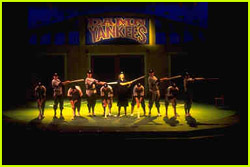"I became interested in lighting design while in my high school drama club,"
says Linda Essig.
"Designing the lighting for our productions provided an outlet for combining
my interest in art and literature with my interest in math and science. Once
I got a taste of professional theater as a summer intern following my sophomore
year of high school, I was completely hooked."
Essig entered New York University under an early admissions program to
pursue a combined bachelor's-master's fine arts degree. "This is not a course
I would recommend to most people today," she says. "Instead, I would recommend
a broad-based liberal arts education to be followed by more specialized graduate
school."
This path worked well for her, however. Now, she is a professor of lighting
design at the University of Wisconsin. "I was on a trajectory that led me
right from the sophomore internship to working as a lighting designer professionally.
Becoming a professor came a bit later as I assessed my lifestyle and artistic
priorities."
She doesn't feel that a career in lighting design will make anyone rich.
But there are other benefits to the job. "I look forward to going to work
in the theater or in my studio and enjoy my creative work -- money can't buy
that!"
 |
| Lighting designers work hard to make sure the audience gets the right
impression of each scene. |
| Courtesy of Michael Abrams |
One thing she finds satisfying about her career is that the end result
is obvious. That's not available in every profession.
"I love being in the theater and watching what was abstractly just some
marks on a piece of paper indicating an angle or position of a light become
the environment for a play or opera," she says. "I particularly enjoy working
on plays that enable me to design environments very specifically, and to work
closely with the actors on how they relate to the lighted environment."
There are always downsides, of course. "Any personal frustrations I feel
are usually technical in nature -- a piece of scenery is not ready in time,
for example. The other, larger frustration, that I am sure is shared by many
in theater, is with the lack of funding for the performing arts in this country."
Brian Sickels is a professor of theater at East Stroudsburg University
in Pennsylvania. "I chose theater as a career because it was my passion, and
still is. I chose teaching because of my love for students," he says.
"My training began early. I had an interest in theater as early as high
school. My interest continued as I pursued both a BA degree in theater and
an MFA degree in stage design and lighting. However, much of my growth occurred
in the professional theater."
Sickels also talks about the satisfaction of being able to experience what
his work produces. "I like the challenge of creating something from nothing.
I like the challenge of bringing literature to life."
In spite of occasional frustrations, which he says at times have made him
want to quit the business, he is challenged by the work. "Ultimately the experience,
whether good or bad, keeps one coming back."
Bill Williams has been a lighting designer since the 1960s, when he trained
in New York City with Broadway theater professionals. "I am always making
new discoveries and having new experiences," he says. "The key is to keep
learning, and to keep an open mind to emerging technologies."
Jill Klores is a senior lighting designer. "I didn't choose this career
exactly," she says.
"I always knew I was interested in architecture, but I did quite well in
the sciences in high school, especially physics. So I went into college with
a major in physics. I soon discovered that wasn't for me. I liked the optics
part of it, but not the mechanics."
She took some time off and went back to a different school and tried some
art and photography classes. But she found there was not enough discipline
in them for her. "I wanted more instruction, more critique. So someone told
me to go to the architecture department. I should've gone with my childhood
instincts all along," she says.
"While enrolled in the architecture school, I took some building systems
electives in the engineering school and found I really liked the lighting
component. So I took as many of the lighting specialty courses as I could."
She feels that her education at the University of Colorado
did the trick for her. But she says many people learn it all on the job. "There's
still a lot of on-the-job training for me. This is not the kind of career
where you can learn most of it in an academic environment, and then go out
there and be a lighting designer."
Klores is one of the lucky people to have found a career that makes her
happy. "It truly mixes the art and the science that I feel inhabit the two
halves of my brain. It is rewarding to see a job complete, and to learn from
every finished product. The process of taking a client's idea or desire to
the drawing board, through the details, and to the on-site adjustment and
fine-tuning is extremely satisfying."
"To be successful in this field, a person needs to be a good listener and
have the ability to get along with all different kinds of people," says Andrew
Lee. He is a lighting designer and salesperson.